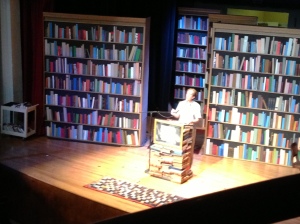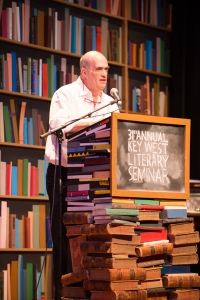Key West Literary Seminar: Session 2 download
 First of all this is not a particularly good photo, I KNOW, and if you want to see much better photos of the Seminar, head on over to Littoral, the Seminar blog. But it's my photo of D.T. Max talking about David Foster Wallace, shot on my phone from my perch in the balcony (that dark thing in the bottom right hand corner is the railing) and I'm going to use it, dammit.
I'll confess I caught less of the second session, which I already regret, but I thoroughly enjoyed what I did see starting with Colm Toibin's masterful keynote on Thursday night that discussed the poets Thom Gunn and Elizabeth Bishop, both poets whose work shows "grief and reason battling it out," according to Toibin -- along with the work of Robert Frost and Joseph Brodsky.
First of all this is not a particularly good photo, I KNOW, and if you want to see much better photos of the Seminar, head on over to Littoral, the Seminar blog. But it's my photo of D.T. Max talking about David Foster Wallace, shot on my phone from my perch in the balcony (that dark thing in the bottom right hand corner is the railing) and I'm going to use it, dammit.
I'll confess I caught less of the second session, which I already regret, but I thoroughly enjoyed what I did see starting with Colm Toibin's masterful keynote on Thursday night that discussed the poets Thom Gunn and Elizabeth Bishop, both poets whose work shows "grief and reason battling it out," according to Toibin -- along with the work of Robert Frost and Joseph Brodsky.
Both Gunn and Bishop were stylistically and personally opposed to the trend of confessional poetry that swept through their chosen field in the 1960s, which certainly did not mean they had not suffered through traumatic times in their lives. Quite the opposite. And it doesn't mean those traumas didn't show up in their poetry. Bishop "buried what mattered to her most in her tone," Toibin said, most tellingly in the villanelle "One Art," about "the art of losing." Toibin calls it "a poem about what cannot be said."
I also didn't know, until Toibin told us, that Bishop wanted the line "awful but cheerful" inscribed on her tombstone. It's the closing line from her poem "The Bight," about Key West.
Other not-quite-random stuff from the seminar:
Ann Napolitano, who includes Flannery O'Connor as a character in her novel A Good Hard Look:
- "You're supposed to be from the South if you write about Flannery O'Connor. I had barely been to the South."
- "There is no way that I could imagine hanging out with Flannery O'Connor. I just think she would eviscerate me in about 30 seconds."
- "Trying to get inside the skin of someone who is very prickly and you don't think would like you is a peculiar experience."
Brad Gooch, author of Flannery, a biography of the same writer:
- "She was her own biographer in the sense she saw her life clearly and created it."
- "As a biographer ... I have to stop where the facts stop. It's sort of annoying, but grounding as well."
- "The thing about biography is that no matter how inspired you get, you sort of need a fact to get from one sentence to another."
- Both Gooch and Napolitano were, in very different ways, inspired to write about O'Connor by "Habits of Being," a collection of her letters.
Brenda Wineapple on biography:
- As a child, "Biography was a genre I didn't understand or really much care for."
- On telling a professor at an academic conference that she was writing a biography: "'How did it feel,' he asked, 'to work on something so theoretically regressive?'" This while swirling sherry condescendingly in his plastic cup.
- "What haunts the house? I think that's what the biographer has to discover."
- "Biography matters because people matter. They matter to us because we want to know them and understand them."
- "Biography is an invasion of privacy made palatable and jusifiable .. by the empathy that inspires it."
D.T. Max, author of "Every Love Story is a Ghost Story," a biography of David Foster Wallace:
- On DFW's college-age ambition to go into politics: "The thought that David Foster Wallace wanted to be a Congressman from Illinois is so weird."
- On writing a biography soon after a subject's death: "The laptop lid opens after the casket closes."
- Biography is "the only nonfiction genre that's survived basically unchanged for the last 200 years."
- On meeting readers with tattoos of lines from DFW's novel "Infinite Jest," or the dates they began and finished the book: "This is not what biographers are used to encountering."
- Comparing the reaction to DFW's death to the reaction to the deaths of John Lennon and Kurt Cobain: "There was a way in which David was toucing people the way musicians usually do."
- "If grief and sadness are what brought a lot of us to Wallace over the years, I certainly don't believe it's what kept us there."
I'll give the last word to Geoff Dyer, even though he speaks in long discursive sentences that are very difficult to get down accurately, especially if you're busy listening for his next witty comment:
- I recognized his surprise, as an undergraduate, when he realized "how quickly doing English came to mean doing criticism."
- I was surprised and delighted to hear him call F. Scott Fitzgerald's "Tender is the Night" "one of my two favorite novels of all time." I loved that book, too, even though, at least in this country, "The Great Gatsby" gets most of the critical love.
- "Thomas Mann's 'Death in Venice' is one of those books everyone has read. You've all read it, even if you've not done so personally."
If there's one image from this Seminar
